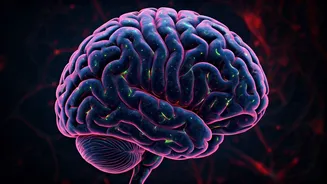Brain Cell Genesis
Scientists are making groundbreaking discoveries about how key brain cells develop within the womb. These 'minibrains,' which are miniature versions of
the human brain, have been instrumental in unraveling the intricacies of brain cell formation. This research could revolutionize how we understand neurological disorders and develop new treatments. The study of these minibrains has provided valuable insights into the fundamental processes that govern brain development. By understanding these processes, scientists hope to develop new treatments for brain-related diseases. The research underscores the critical importance of studying the earliest stages of brain development, offering a window into potential interventions to prevent or mitigate neurological conditions.
Genetic Influences
Genetics play a critical role in brain health and function. Researchers have identified unique gene variants in different populations, such as the Turkana people of Kenya, which may influence their ability to survive in harsh environmental conditions. The inheritance of traits from ancestors also has a significant impact on brain-related conditions, highlighting the interconnectedness of genes and overall health. Furthermore, ongoing research is exploring how genes on the X chromosome may contribute to the higher prevalence of multiple sclerosis in women. This research is also studying a gene that distinguishes humans from Neanderthals. Understanding the genetic factors at play allows for improved detection, prevention, and treatment of brain diseases.
Excluding Females
For a long time, the field of neuroscience has been held back by the exclusion of female animals from research. This omission has led to incomplete understanding of brain processes and potential treatments for female-specific neurological conditions. Scientists are now addressing this historical oversight by including female subjects in their studies. This has already begun to offer deeper insights into the differences between male and female brains. By actively including female subjects, scientists can achieve a more comprehensive understanding of brain function and develop more inclusive treatments that benefit everyone, regardless of gender.
Brain's Drainage System
Recent studies suggest that 'chemo brain,' a common side effect of chemotherapy, may stem from damage to the brain's drainage system. This system, responsible for clearing waste from the brain, may be compromised by the effects of chemotherapy. Scientists are investigating the use of nanoparticles to mitigate the damage caused by chemotherapy. These tiny particles may hold promise in delivering targeted therapies, potentially reducing side effects and improving treatment outcomes. Such findings open new avenues for treatment and underscore the importance of understanding the intricate workings of the brain's waste removal systems in the context of cancer therapy.
Egg Preservation Tactics
Human eggs need special protection to stay fresh throughout a woman's lifetime. Research is exploring the mechanisms that help preserve the quality of eggs as the body ages. This is important for understanding fertility and reproductive health. Scientists are looking for ways to improve these protective mechanisms, and potentially slow the decline in egg quality. The latest findings could offer new ways of supporting fertility and treating conditions related to ovarian aging. Understanding these natural processes could lead to breakthroughs in reproductive medicine, offering potential solutions for those facing fertility challenges.
Hidden 'Superpowers'
Humans may possess untapped 'superpowers' due to genes related to hibernation. Scientists believe that these genes, which are associated with the ability to enter a state of dormancy, could have additional functions that have yet to be discovered. Research in this field aims to understand the potential benefits of these genes in relation to brain function. There is growing evidence to suggest that unlocking these genes could lead to breakthroughs in treating neurological disorders and enhancing cognitive abilities. Further exploration in this domain may uncover new therapeutic strategies for a range of health issues.
AI & Brain Mapping
Artificial intelligence (AI) is being used to map uncharted areas of the mouse brain, revealing new details about its structure and function. AI algorithms are proving to be powerful tools for dissecting the complex circuits and networks within the brain. This technology is instrumental in accelerating scientific discoveries in the field of neuroscience. AI's ability to analyze vast amounts of data allows researchers to identify previously unrecognized patterns and relationships within the brain. This methodology could lead to a deeper understanding of brain functions, potentially offering new approaches for studying the human brain in the future.












